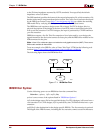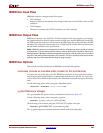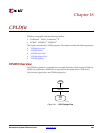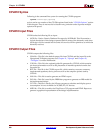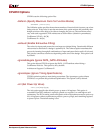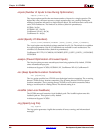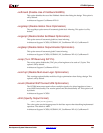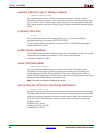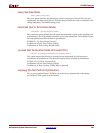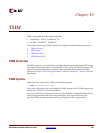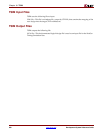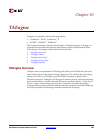
302 www.xilinx.com Development System Reference Guide
Chapter 18: CPLDfit
R
–inputs (Number of Inputs to Use During Optimization)
-inputs [limit:2,36]
The -inputs option specifies the maximum number of inputs for a single equation. The
higher this value, the more resources a single equation may use, possibly limiting the
number of equations allowed in a single function block. The maximum limit varies with
each CPLD architecture. The limits are as follows (default in parentheses):
XC9500 = 36 (36)
XC9500XL/XV = 54 (54)
CoolRunner XPLA3 = 40 (36)
CoolRunner-II = 40 (36)
–iostd (Specify I/O Standard)
-iostd [LVTTL|LVCMOS18|LVCMOS25 |SSTL2_I|SSTL3_I|HSTL_I|LVCMOS15]
The -iostd option sets the default voltage standard for all I/Os. The default is overridden
by explicit assignments. Not all I/O standards are available for each architecture. The
available I/O standards follow (default in parentheses):
CoolRunner-II: LVTTL, LVCMOS18, LVCMOS25, SSTL2_I, SSTL3_I, HSTL_I, LVCMOS15,
LVCMOS18
–keepio (Prevent Optimization of Unused Inputs)
The -keepio option prevents unused inputs from being optimized. By default, CPLDfit
trims unconnected input pins.
Architecture Support: XC9500, XC9500XL/XV, CoolRunner XPLA3, CoolRunner-II
–loc (Keep Specified Location Constraints)
-loc [on|off|try]
The -loc option specifies how CPLDfit uses the design location constraints. The on setting
directs CPLDfit to obey location constraints. The off setting directs CPLDfit to ignore
location constraints. The try setting directs CPLDfit to use location constraints unless
doing so would result in a fitting failure. The default setting is on.
–localfbk (Use Local Feedback)
The XC9500 macrocell contains a local feedback path. The -localfbk option turns this
feedback path on. This option is off by default.
Architecture Support: XC9500
–log (Specify Log File)
-log logfile
The -log option generates a logfile that contains all error, warning, and informational
messages.



